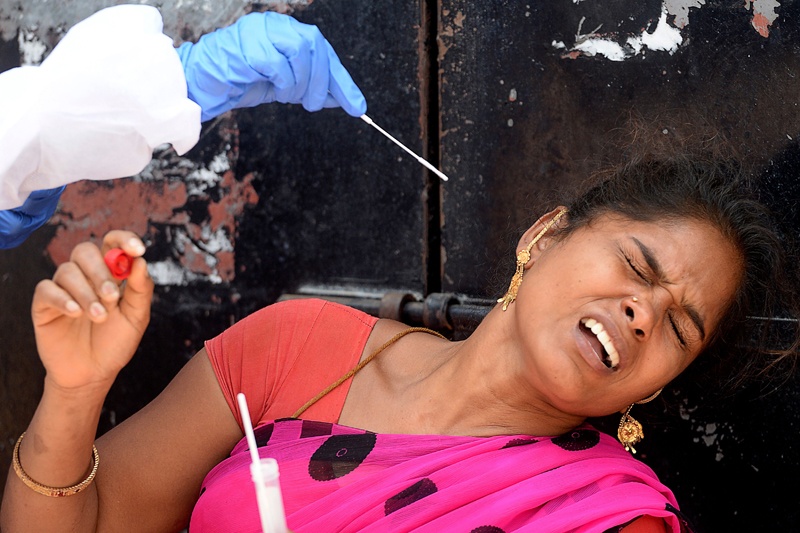
NEW DELHI: Global coronavirus infections soared past 25 million yesterday, as countries around the world further tightened restrictions to try to stop the rampaging pandemic. A million additional cases have been detected globally roughly every four days since mid-July, according to an AFP tally, with India yesterday setting the record for the highest single-day rise in cases with 78,761. Even nations such as New Zealand and South Korea, which had previously brought their outbreaks largely under control, are now battling new clusters of infections.
The surge in India, home to 1.3 billion people, came as the government further eased lockdown restrictions on the weekend to help ease pressure on the reeling economy. India is already the world's third-most infected nation with more than 3.5 million cases, behind the US and Brazil. It has also reported more than 63,000 deaths, according to the official health ministry toll. The US set the previous record on July 17 with 77,638 daily infections, according to an AFP tally.
Experts warn that while a ramp up in testing in recent months was encouraging, more needed to be done to capture the scale of the pandemic in the world's second-most populous nation. India's home affairs ministry said gatherings of up to 100 people would be allowed with face masks and social distancing at cultural, entertainment, sports and political events from next month. Metro train services would also resume "in a graded manner" in major cities. Schools remain closed but students can meet teachers on a voluntary basis on school premises if needed, according to the new guidelines.
On the other side of the world, Latin America - the worst-hit region - is still struggling with its first wave, with COVID-19 deaths in Brazil crossing 120,000, second only to the United States. Brazil's curve "has stabilized now, but at a very dangerous level: nearly 1,000 deaths and 40,000 cases per day," said Christovam Barcellos, a researcher at public health institute Fiocruz. "And Brazil still isn't past the peak."
More than 843,000 people have died of COVID-19 globally, and with no vaccine or effective treatment available yet, governments have been forced to resort to some form of social distancing and lockdowns to stop the spread of the virus. Masks will become mandatory from today on public transport and flights in New Zealand, which went more than 100 days without local transmission before the current cluster emerged.
And tightened virus curbs kicked in yesterday in South Korea, which is also battling fresh clusters - including in the greater Seoul region, home to half the country's population. In Iraq, thousands of Shiite pilgrims wearing gloves and masks flooded the holy city of Karbala to mark Ashura, in one of the largest Muslim gatherings since the pandemic began.
Typically, millions of Shiites from around the world flock to the shrine, but this year's commemoration was subdued with employees spraying disinfectant mist, checking temperatures and enforcing social distancing. "Honestly, this year is nothing like the millions-strong commemorations of other years," said Fadel Hakim, a blue medical mask cupping his chin. "It stands out because there are so few people."
Despite the grim numbers, there has been steady opposition to lockdowns and social distancing measures in many parts of the world, often because of their crushing economic cost. But resistance has also come from the extreme right and left of the political spectrum, as well as conspiracy theorists and anti-vaccine campaigners.
In Berlin on Saturday, thousands gathered to march against coronavirus restrictions-but police later stopped the rally because many participants were not respecting social distancing measures. Protesters waved German flags and shouted slogans against Chancellor Angela Merkel often used by the far-right Alternative for Germany (AfD) party.
Many carried placards promoting widely debunked conspiracy theories about vaccines, face masks and 5G communications. Similar protests were held in London and Zurich, where some carried signs supporting the far-right QAnon movement, which promotes bizarre theories about Satan-worshipping cabals and "deep state" plots - without any credible evidence.
The pandemic has upended economies and societies around the world, and halted most large gatherings - from sport and music to religion and politics. In Spain, football superstar Lionel Messi missed a virus test at Barcelona's training ground, club sources confirmed, raising the possibility he will boycott pre-season to force a transfer from the Spanish club. Without a coronavirus test, Messi will be unable to join team-mates for new coach Ronald Koeman's first training session today.
The Tour de France set off from the French Riviera on Saturday, two months later than originally planned and with the French sport minister not ruling out the cancellation of the event because of the coronavirus. Under the Tour rules, any team with two positive tests in its entourage will be expelled. A virus testing cell will travel with the teams throughout the race.
The world's top sport, culture and music events are struggling with the challenge of hosting spectators while reducing the risk of virus transmission. But there was some cheer on Saturday in New York, once among the world's biggest coronavirus hotspots. Visitors raised their arms, clapped and lined up to get tickets as New York's Metropolitan Museum of Art reopened its doors to the public in a festive atmosphere after a six-month closure. - Agencies
.jpg)



